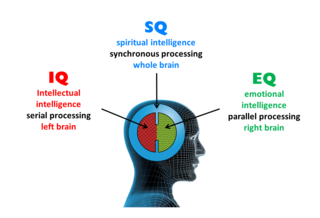Is "Spiritual Intelligence" a Valid Concept? | Psychology TodayIs "Spiritual Intelligence" a Valid Concept?
"Spiritual Intelligence" has become a popular idea, but is it scientific?
Posted August 30, 2017
Inspired by Gardner’s concept of
multiple intelligences, the concept of “spiritual intelligence” has gained popularity in recent years, and is the subject of several books and websites. Although limited empirical research has been performed to validate the concept, a great deal of nonsense has been written about this topic (e.g. this
paper in an actual academic journal) that goes way beyond any empirical evidence. Despite this, I think it is possible to study experiences of a “spiritual” nature from a scientific standpoint without necessarily endorsing spiritual beliefs that are not evidence-based. So, rather than dismissing the concept of “spiritual intelligence” out of hand, I think it would be interesting to consider with an open mind whether
spirituality and intelligence can be meaningfully combined and attempt to draw something of substance from the topic. Although several models of spiritual intelligence have been proposed, in this article I will critically examine the concept as developed by Robert Emmons and considers what it might represent if it were a real ability. That is, from a scientific perspective, could there be a genuine form of ability going by the name spiritual intelligence? And if so, what would its nature be?

Claims about spiritual intelligence using scientific-sounding jargon, as illustrated in this diagram, have been popularized but are not based on empirical evidence
Source: Spiritual Intelligence Training website
Emmons (2000a, 2000b) defines spiritual intelligence “as the adaptive use of spiritual information to facilitate everyday problem solving and goal attainment.” This is distinct from the broader concept of spirituality, which he refers to as a “search for the sacred,” that is, an experience that is meaningful in itself. Emmons argues that spiritual intelligence can be used to improve the overall quality of one’s life, and enhance one’s well-being. More specifically, he regarded it as applicable to problems related to meaning, and to solving problems in the spiritual domain. Emmons claims that spiritual intelligence can bring about
personality integration, i.e. “bringing about unity in the person, rescuing the psyche from inner turmoil and conflict.” What Emmons seems to be talking about is something that provides a unifying framework for one’s whole life, especially one’s inner life. In particular, the aim seems to be to bring about a state of functioning characterised by harmony as opposed to conflict, presumably where all a person’s strivings and impulses are coordinated in service of an overarching purpose that is perceived as having deep personal meaning.
Emmons claimed that spiritual intelligence consists of several components: capacity to transcend the physical and material, ability to experience heightened states of consciousness, ability to sanctify everyday experience, and ability to utilize spiritual resources to solve problems. Originally, he also include the capacity to be virtuous, but withdrew this (Emmons, 2000b) in response to criticism (Mayer, 2000) that virtues are non-cognitive components of personality and not really features of intelligence. This criticism could be applied to the other components, but Emmons defended their inclusion. Emmons explained that the first two components relate to a person’s capacity for experiencing transcendental and mystical states of consciousness, such as experiencing a sense of oneness with all things. He argued that spiritually intelligent individuals would be highly skilled in entering such states. The third component, sanctification, refers to be being able to imbue activities of everyday life with spiritual meaning, such as being able to identify a high purpose in one’s daily goal strivings. The fourth component involves religious and spiritual coping, such as revising one’s priorities in life or finding meaning in
traumatic experiences.
article continues after advertisement
Emmons justifies the concept of spiritual intelligence using Gardner’s framework of multiple intelligences. I have critiqued Gardner’s theory in some detail in a
previous article. Briefly, Gardner proposed that many kinds of abilities deserve to be called intelligences in their own right as opposed to the idea of there being a single
general intelligence that can be measured with IQ tests. Although this is a popular idea with considerable intuitive appeal, it has not been supported by empirical evidence and is not scientifically respected (Waterhouse, 2006). One of the problems with theories involving “multiple intelligences’ is that if the theory is correct, then the various kinds of “intelligences” should be statistically distinct from each other and from general intelligence or IQ. That is, it should be common for people to have high ability in some kinds of intelligence, and not in others. However, research to date has overwhelmingly found that diverse abilities involving
cognition are strongly positively interrelated. Hence, people who are high in certain abilities, more often than not, tend to be high in others. There are always individual exceptions, but exceptions are what they are, which is the opposite of what Gardner’s theory predicts. This also applies to “
emotional intelligence,” another “alternative” intelligence, that has (wrongly) been touted as more important for success in life then IQ. Attempts to assess
emotional intelligence have used both “trait” (self-assessment) and “ability” (tests with correct and incorrect answers) approaches. Research has found that trait emotional intelligence is substantially correlated with personality traits (Van der Linden, Tsaousis, & Petrides, 2012), whereas ability emotional intelligence is moderately positively correlated with general intelligence (Van Rooy & Viswesvaran, 2004). This suggests, that emotional intelligence is most likely not a completely distinct type of intelligence, but to some extent the application of general intelligence to the domain of emotions. Similarly, I think it is highly likely that Emmons’ concept of spiritual intelligence would turn out to be correlated with personality and general intelligence as well, depending on how it was measured. Hence, rather than being a completely separate form of intelligence, along Gardner’s lines, it might, if it exists, involve applying general intelligence to the domain of spiritual concerns. Looking at it this way means that the concept can be considered on its own merits without any commitment to some version of Gardner’s claim that there are multiple intelligences that are unrelated to general intelligence (which is not supported by evidence).
Interestingly, although Gardner (2000) is open-minded about the possible existence of “existential intelligence,” the ability to think deeply the nature of reality and one’s place in it, he considered but finally rejected the idea of spiritual intelligence, because spirituality involves phenomenological experiences, which he does not consider intrinsic to the core feature of intelligence, i.e. the ability to carry out computations. John Mayer (2000), who is famously associated with the concept of emotional intelligence, expressed similar concerns that spirituality mainly involves states of consciousness, whereas intelligence is usually defined in terms of abstract reasoning. Emmons (2000b) replied that he believed that the ability to use spiritual information to solve problems justifies considering this ability an intelligence. An alternative that avoids these problems is to consider spiritual intelligence as an ability to reason about and apply insights from “spiritual” experiences.

Source: Free image from Pixabay
Emmons defines spirituality as a search for the sacred, for experience that is meaningful in and of itself. He defines intelligence as “the implementation of a set of tools to arrive at a more productive, effective, happier, and ultimately more meaningful life.” Therefore, “spiritual intelligence” puts these together to solve problems in the spiritual domain and improve one’s overall quality of life. Note that this is a value-laden definition of intelligence, as more traditional definitions are more value-neutral, e.g. being intelligent in the more conventional sense does not necessarily make one happier, and people who are not highly intelligent can be very happy, such as by being content with what they have. However, being intelligent is advantageous in solving many kinds of problems. Perhaps “spiritually intelligent” people are better at solving problems specifically related to their quality of life? There is evidence that experiences of a "spiritual" nature, such as feeling connected to a larger reality, or having a sense that one’s life is meaningful can have a positive effect on one’s well-being. For example, one famous study on
psilocybin found that many of the participants had a profound mystical experience involving a sense of unity with all things, intense positive emotion, and ineffability, that they considered one of the most significant experiences of their lives more than a year later (Griffiths, Richards, McCann, & Jesse, 2006). (I discuss this study in a
previous post.) However, Emmons notes that it is possible for spirituality to produce problems as well, stating “spirituality may promote healthy functioning in some realms of life while straining functioning in others.” For example, a person might become preoccupied with spiritual concerns to the point that they neglect more mundane pursuits, or they might experience conflict between how much time and energy they devote to spiritual strivings compared with their other desires, such as pursuing work and relationships. Perhaps, this is where the intelligence part becomes important. That is, having the ability to make use of spiritual experiences in an adaptive and balanced way as opposed to developing some form of spiritual pathology. Hence if one is spiritually intelligent, presumably one can make good use of whatever insights one has gained from one’s experiences, rather than simply feeling good about them, or withdrawing from everyday life into one’s inner world.
In the
next part of this article, I will consider what this “spiritual intelligence” might consist of in terms of personality, general intelligence, and why altered states of consciousness might be important for the construct. In the
final part, I will consider further criticisms of the concept.
© Scott McGreal. Please do not reproduce without permission. Brief excerpts may be quoted as long as a link to the original article is provided.
article continues after advertisement
Related posts
The Illusory Theory of Multiple IntelligencesEmotional Intelligence and Understanding Psychopathy - a critique
References
Emmons, R. A. (2000a). Is Spirituality an Intelligence? Motivation, Cognition, and the Psychology of Ultimate Concern. International Journal for the Psychology of Religion, 10(1), 3-26. doi:10.1207/s15327582ijpr1001_2
Emmons, R. A. (2000b). Spirituality and Intelligence: Problems and Prospects. International Journal for the Psychology of Religion, 10(1), 57-64. doi:10.1207/s15327582ijpr1001_6
Gardner, H. (2000). A Case Against Spiritual Intelligence. International Journal for the Psychology of Religion, 10(1), 27-34. doi:10.1207/s15327582ijpr1001_3
Griffiths, R. R., Richards, W. A., McCann, U., & Jesse, R. (2006). Psilocybin can occasion mystical-type experiences having substantial and sustained personal meaning and spiritual significance. Psychopharmacology, 187(3), 268-283. doi:10.1007/s00213-006-0457-5
Mayer, J. D. (2000). Spiritual Intelligence or Spiritual Consciousness? International Journal for the Psychology of Religion, 10(1), 47-56. doi:10.1207/s15327582ijpr1001_5
Van der Linden, D., Tsaousis, I., & Petrides, K. V. (2012). Overlap between General Factors of Personality in the Big Five, Giant Three, and trait emotional intelligence. Personality and Individual Differences, 53(3), 175-179. doi:
https://doi.org/10.1016/j.paid.2012.03.001Van Rooy, D. L., & Viswesvaran, C. (2004). Emotional intelligence: A meta-analytic investigation of predictive validity and nomological net. Journal of Vocational Behavior, 65(1), 71-95. doi:
http://dx.doi.org/10.1016/S0001-8791(03)00076-9Waterhouse, L. (2006). Multiple Intelligences, the Mozart Effect, and Emotional Intelligence: A Critical Review. Educational Psychologist, 41(4), 207-225. doi:10.1207/s15326985ep4104_1
Image Credit
"Three dimensions of intelligence" - Spiritual Intelligence Training website. (Posting this image here does not in any way imply endorsement by or of this organization.)Morereferences

Scott McGreal is a psychology researcher with a particular interest in individual differences, especially in personality and intelligence.Online:
Facebook,
Twitter
![]() is His slave and Messenger.
is His slave and Messenger.![]() said in his book I‘laam Al-Muwaqqi‘een: "Makr is defined as causing something to others in a hidden manner, and it also conveys the meanings of plotting and deceit.
said in his book I‘laam Al-Muwaqqi‘een: "Makr is defined as causing something to others in a hidden manner, and it also conveys the meanings of plotting and deceit. ![]() said: "These qualities are indicative of perfection when they counter the opponents’ evil schemes with their like, because they point to the doer’s strength, and his being superior to his enemy, and the ability to overcome him and counter his evil acts with their like or even more severe acts. They are indicative of imperfection in any other context. This is why Allah, The Almighty, never attributes such qualities to Himself in their absolute or broader sense. Rather, He only attributes Makr to Himself to mean a counterplot to frustrate the evil plots of those scheming against Him and His messengers
said: "These qualities are indicative of perfection when they counter the opponents’ evil schemes with their like, because they point to the doer’s strength, and his being superior to his enemy, and the ability to overcome him and counter his evil acts with their like or even more severe acts. They are indicative of imperfection in any other context. This is why Allah, The Almighty, never attributes such qualities to Himself in their absolute or broader sense. Rather, He only attributes Makr to Himself to mean a counterplot to frustrate the evil plots of those scheming against Him and His messengers ![]() . For instance, He Says (what means):
. For instance, He Says (what means):![]() said in an authentic Hadeeth: "Let him who hears of the Dajjaal (Antichrist) go far from him, for I swear by Allah that a man will come to him thinking himself to be a believer and end up following him because of the misconceptions he (the Dajjaal) would rouse in him." [Abu Daawood]
said in an authentic Hadeeth: "Let him who hears of the Dajjaal (Antichrist) go far from him, for I swear by Allah that a man will come to him thinking himself to be a believer and end up following him because of the misconceptions he (the Dajjaal) would rouse in him." [Abu Daawood]


 Audible sample
Audible sample
 Audiobook
Audiobook

